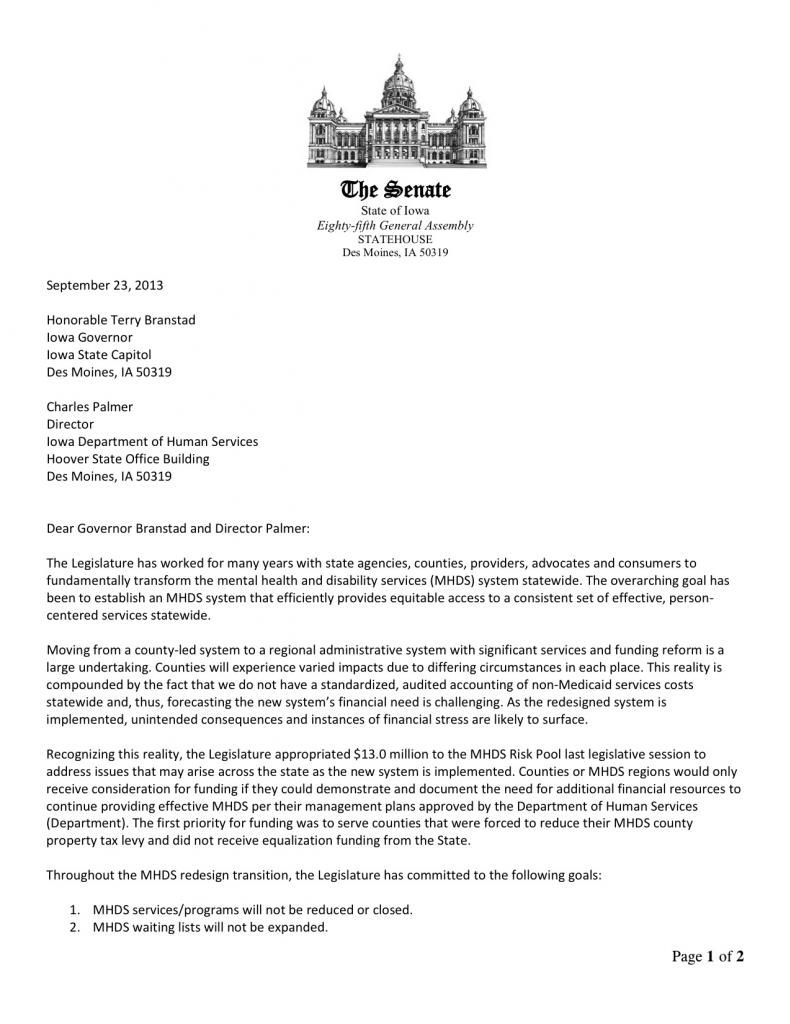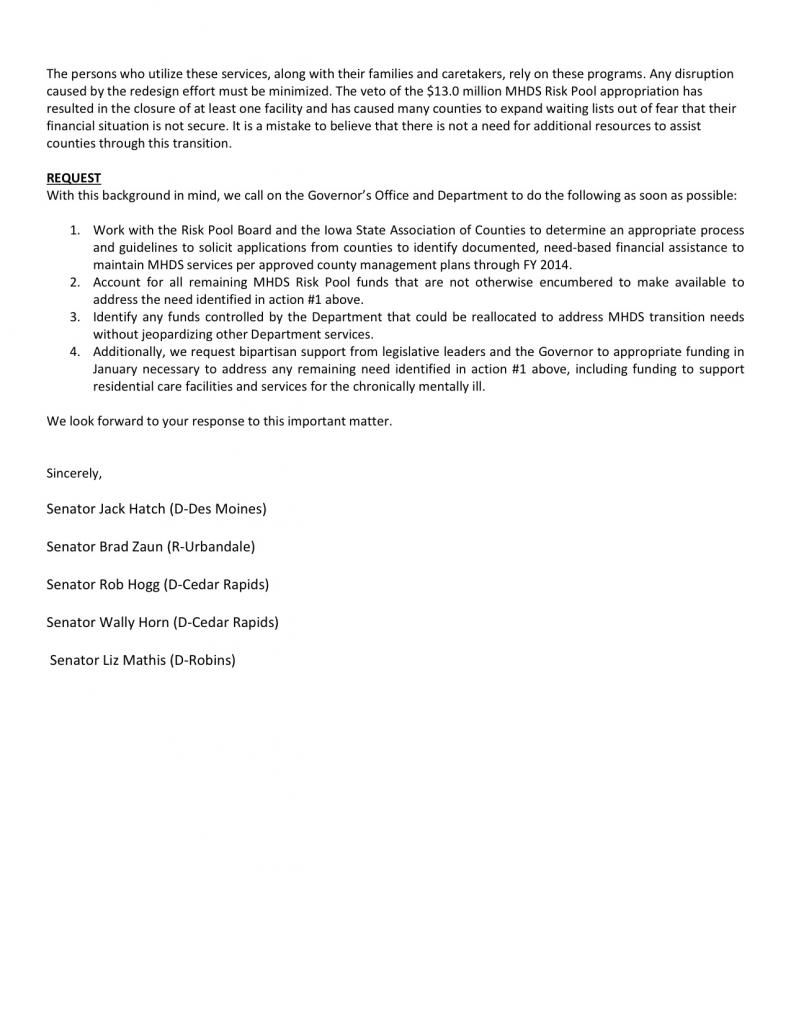Iowa’s constitution allows the governor to line-item veto provisions in appropriations bills, and Governor Terry Branstad has used that power to overrule legislative decisions on many spending proposals, large and small. Among this year’s line-item vetoes, perhaps the most controversial was Branstad’s surprising decision to ax $13 million for mental health services. That line item was intended to cushion the blow for counties as Iowa reorganizes its mental health care delivery system. (In the past, available care depended greatly on a patient’s county of residence.) Despite broad bipartisan support for this appropriation and a large state budget surplus, Branstad decided that counties didn’t need extra help with mental health services.
This week four Democratic state senators and one Republican asked Branstad to help fix the mess he created, which has already led to some service cuts.
Background: The $13 million for the mental health and disability services (MHDS) Risk Pool was part of House File 648, a supplemental appropriations bill that received final approval on the last day of the 2013 legislative session. The bill passed the Iowa House unanimously, although only two Republicans (Hubert Houser and David Johnson) joined the 26 Iowa Senate Democrats in voting for the final version.
On June 20, Branstad signed House File 648 but vetoed 10 of its appropriations. You can read his letter explaining the vetoes here (pdf). Here’s the relevant excerpt:
I am unable to approve the item designated as Section 10 in its entirety. This item transfers $13,000,000 to the risk pool at the Department of Human Services for payment of mental health costs at the county level. Under the new Iowa Health and Wellness Plan, Iowans will have access to high quality mental health services. These services will be fully funded by federal dollars which greatly reduces the demand on county mental health funds. Counties are already receiving additional funds aiding the redesign of the mental health system, including $11,628,317 in transition funds and $29,820,478 in equalization funding, as well as the $110,656,258 to be collected statewide in property taxes to support mental health services. The additional risk pool funding is not necessary at this time.
Pet peeve 1: Why does Branstad always write that he is “unable to approve” this or that appropriation, when the truth is he just doesn’t want to sign off on the funding?
Pet peeve 2: Why does Branstad tout the expected federal funding for Iowa’s alternative to Medicaid expansion when he spent months arguing that in a time of federal deficits it would be irresponsible to increase federal spending on health care for low-income Iowans?
Pet peeve 3: Doesn’t the governor realize that the Iowa Health and Wellness Plan won’t be implemented until halfway through the 2014 fiscal year? The $13 million state lawmakers approved for the risk pool could have been tapped beginning on July 1. That’s months before federal funding could start supporting mental health care under the Iowa Health and Wellness Plan, even if the U.S. Department of Health and Human Services signed off on the Medicaid expansion alternative.
Iowa Senate Judiciary Committee Chair Rob Hogg sounded the alarm immediately in a written statement issued the day after Branstad’s veto.
“Governor Branstad’s item veto will endanger Iowans. After the shootings at Sandy Hook and other recent tragedies, Iowans wanted us to restore and improve our mental health system. The Legislature did that with strong bipartisan support. Governor Branstad’s item veto shows he is out of touch with Iowans’ strong support for mental health services.
“At a time when the state has a large cash surplus, there was absolutely no need for Governor Branstad to item veto the funding for our mental health safety net. This money was essential to prevent any county from cutting mental health services during the transition to a regional mental health system, and to prevent any Iowan who needed mental health services from falling through the cracks. With the item veto, counties and community providers will once again struggle to provide basic mental health services.
“Not every person with a mental health condition is a public safety risk, and not every public safety risk is due to mental illness. But suicides in Iowa have been increasing, and inmates in Iowa’s prisons have diagnosed serious mental illnesses at a rate 3 to 10 times higher than the rate in the general population. The Legislature acted on a bipartisan basis to provide the funding necessary to address this problem; Governor Branstad’s item veto failed Iowans’ interest in public safety and mental health services.”
Branstad insisted that he was saving Iowans from funding an unneeded “bailout” for counties.
“We believe the counties have been treated very fairly in this process and that they also have received substantial money from the state,” he said. “We want to work with them through this situation, but we think the mental health redesign also needs to be one that protects the interests of the taxpayer.”
Not surprisingly, those who speak for the counties took a different view.
Linda Hinton, a lobbyist for the Iowa State Association of Counties, said the money’s purposes included helping counties that are being forced to cut their property tax levies because they have been charging more than the state average. She said the money also would have helped counties that will saw a spike in mental-health bills because of a shift away from sending the bills to counties from which service recipients originally came.
In response to Branstad’s point about new federal money from the “Iowa Health and Wellness Plan,” Hinton noted that the program wouldn’t take effect until Jan. 1, no one knows how much it would save, and the Legislature said that 80 percent of the savings must be sent to the state or returned to property taxpayers.
Five senators signed an open letter to Branstad on September 23, asking him to help mitigate the impact of his item veto. The four Democrats are Jack Hatch, a candidate for governor who chairs the Senate’s Health and Human Resources budget committee, and three senators from Linn County, where a residential care facility is slated to close within days. The only Republican to sign was Senator Brad Zaun. Although he didn’t vote for final passage of House File 648, I give him huge credit for stepping up to the plate here, when Iowa House and Senate Republican leaders have been silent.
I’ve enclosed the full text of the senators’ letter to Branstad at the end of this post. An Iowa Senate press release of September 23 cited “reports of growing waiting lists for mental health care in various counties” and the impending “October 1st closure of the Abbe Center for Community Care in Marion, which provided residential care to patients released from more intensive hospital mental health units.” (For the record, Abbe Center President Dan Strellner did not blame Branstad’s veto for the decision to close the center. Linn County has been sending fewer patients to the center and more to 24-hour residential care settings.)
Nevertheless, it’s unwise for Iowa to allow county waiting lists for mental health care to grow while the state’s surplus and reserve funds are full. Branstad shouldn’t find it difficult to honor the senators’ reasonable requests.
The governor has the authority to move money around within the DHS budget, the senators said, and they want him to tap the department’s High Risk Pool to make funds available now rather than wait until the Legislature goes back into session in January to make transitions funds available.
“This is something they can do this year,” said Sen. Jack Hatch, D-Des Moines.
The senators – Wally Horn, Rob Hogg and Liz Mathis, all Cedar Rapids Democrats, Brad Zaun, an Urbandale Republican and Hatch – are asking that Branstad and the DHS work with the Risk Pool Board and the Iowa State Association of Counties to develop a process for soliciting applications from counties to identify documented, need-based financial assistance to maintain mental health services. Also, they want all other risk pool funds not otherwise encumbered to be made available to address counties’ needs. Finally, they want DHS funds identified that could be reallocated to address mental health without jeopardizing the agency’s other services.
For their part, the senators said they will support a bipartisan effort to replace the High Risk Pool funds and address additional funding needs in January. Hatch said a “small supplemental appropriation” may be necessary.
So far, the governor’s office is non-committal.
Branstad spokesman Tim Albrecht said the governor will review the senators’ recommendations.
Albrecht wrote in an email to the Register that Branstad is “committed to a sustainable mental health system that benefits all Iowans. Since mental health redesign began more than two years ago, the state of Iowa has invested more than $115 million in new state funding for mental health services at the county level.”
The Iowa State Association of Counties has said the $13 million was needed to prevent waiting lists or closure of services in several counties struggling to make the transition from a county-by-county mental health system to the new regional arrangement. The switch-over includes complicated shifts in financing among county, state and federal sources.
Any relevant comments are welcome in this thread.


